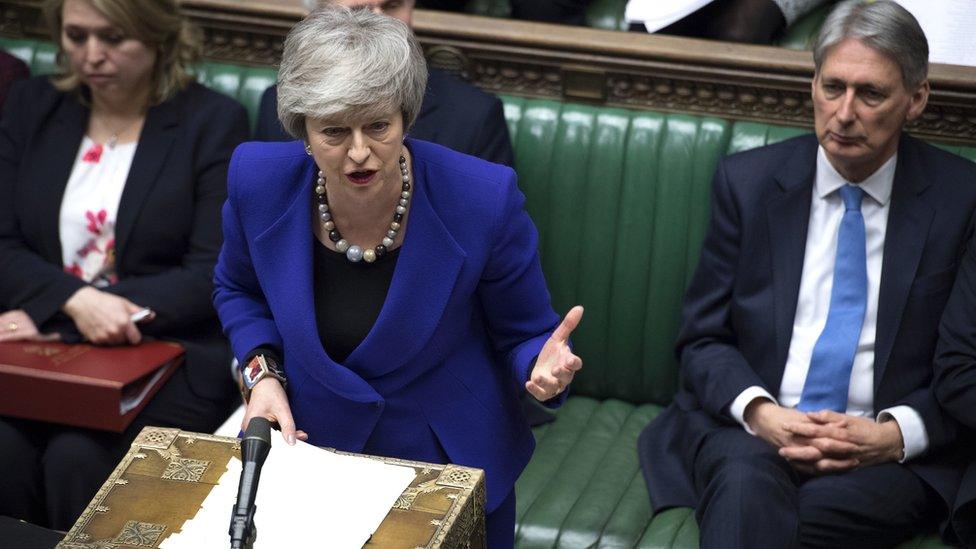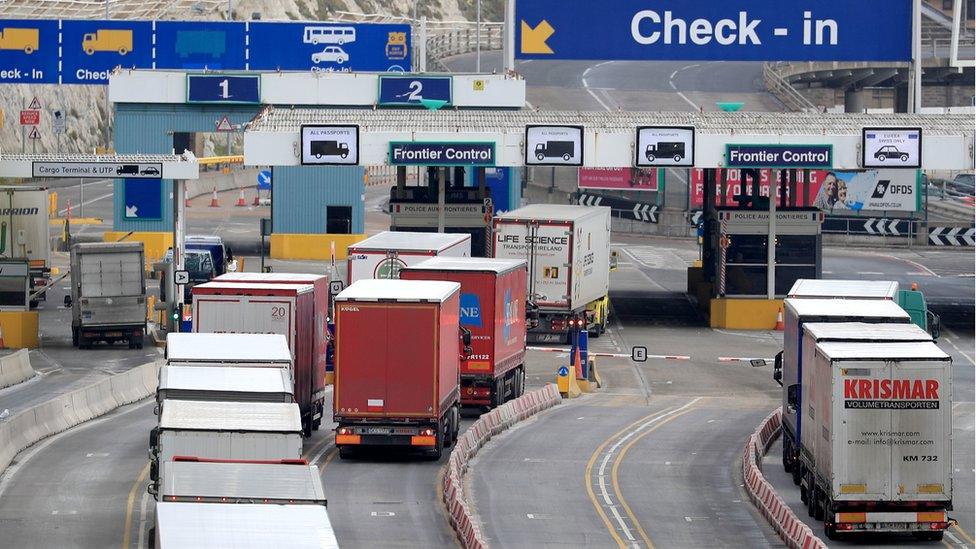Brexit: How ready is the UK government for no deal?
- Published
- comments

The government isn't ready for the prospect of the UK leaving the EU with no deal in two months' time, according to a report from the Institute for Government, external.
There is a very significant risk that laws needed to replace those governing key aspects of the UK's relationship with the EU will not get passed within the next two months, the IFG said.
The report concluded that the government would be unable to avoid serious disruption in most policy areas.
The government has pointed out that, by the end of the 2019-20 tax year, it will have spent more than £4bn preparing for Brexit (although not all of that is on preparations for a no-deal scenario).
It has also said it has about 10,000 civil servants working on Brexit, with another 5,000 to come.
"We will ensure our statute books are ready for exit day and are making good progress on passing primary legislation," a spokesperson from the Department for Exiting the European Union said.
But IFG director Bronwen Maddox said: "The UK is not ready for no deal.
"The disruption from no deal - simply from the lack of preparation - would be extremely damaging.
"It cannot be dismissed as a mere blip."
Timetable
Leaving the EU with no deal is the default position on 29 March unless a withdrawal agreement can be approved in Parliament in the next few weeks.
The only other options are to extend the Article 50 negotiating process to buy more time, or to withdraw the Article 50 notification altogether, which would mean Brexit wouldn't happen.
So - with two months to go - what does the government still need to do to prepare for a no-deal scenario?
Legislation
Well, first of all, it needs to replace laws that will disappear overnight if there is no withdrawal agreement with the EU and no transition period after Brexit.
But the IFG says five big bills in Parliament - on trade, agriculture, fisheries, immigration and financial services - face major challenges.
Some of them have yet to start their passage through the House of Lords, where the government does not control parliamentary time.
And the government's fragile majority in the House of Commons makes things worse.

The prospects for passing another law that will be needed in the event of no deal - on international health care arrangements - are described as uncertain.
The government is also behind schedule on passing secondary legislation - important technical changes known as statutory instruments (SIs).
Only about 100 of 600 SIs required for a no-deal Brexit have been approved and nearly half of that total haven't yet been tabled in Parliament.
Implementation
An even bigger risk, the IFG says, is that new processes, systems and staff would have to be in place by the end of March to avoid disruption - and, in many cases, they won't be. Time is running out.
In eight out of 11 broad policy areas - including borders, health, and law and justice, the IFG report says the government would be unable to avoid some "major negative impacts".
Part of the problem is that businesses and citizens also need to be ready.
They would normally be given years to prepare for these kind of sweeping changes but the government only started releasing technical notices about a no-deal scenario in August 2018.
Businesses also haven't been told yet what kind of tariff regime (the taxes on goods coming into the country) will operate after Brexit, while surveys suggest small businesses simply haven't had the time or the resources to prepare properly for a no-deal scenario.

There could be long delays at Dover
Many of the problems, the IFG says, are down to the "sheer scale and complexity" of the task.
But the government is also criticised in this report for excessive secrecy in the way it has made preparations.
It has been "unwilling to talk publicly about its plans", the IFG says, and has developed an "adversarial relationship with Parliament".
The Department for Exiting the European Union (DExEU) says, "The government has conducted extensive planning and preparation for the past two years to ensure the country is ready for a range of scenarios.
"In addition to extensive guidance online and a publicity campaign, this includes the publication of 106 technical notices, which help businesses and citizens prepare for the possibility of the UK leaving the EU without a deal."
Transition
Prime Minister Theresa May still hopes, of course, that a deal can be done in the next few weeks and that Brexit on 29 March will be followed by a transition period of at least 21 months, when all the rules and regulations would stay the same.
And if a withdrawal agreement is ratified, and a transition period begins, the only legislation that would need to be passed before Brexit day would be a bill turning that agreement into UK law.
Even time to do that, though, is running short.


